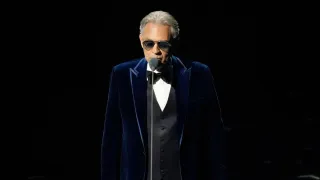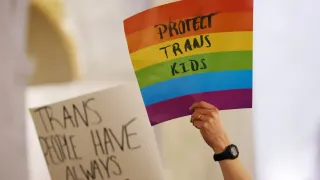March 14, 2023
Review: Richard Mirabella's 'Brother & Sister Enter the Forest' is a Family Affair
Tim Pfaff READ TIME: 5 MIN.
The title of Richard Mirabella's debut novel, "Brother & Sister Enter the Forest" promises the sinister, and Mirabella makes good on the promise. The plot sits queasily somewhere between "Hansel and Gretel" and "A Long Day's Journey Into Night." The title characters – brother, Justin, and sister, Willa – are mired in the emotional wasteland of upstate New York.
Justin, a prodigal brother as well as son, is gay and, in his own estimation, "a fuckup." He's never far from the novel but ghosts his family for years at a time. Willa is a nurse with aspirations to make art with her dioramas. Her inner nurse cannot abandon a brother she genuinely loves, but his attempts to "move back in" work her last nerve.
Unable to solve a problem like Justin, she runs interference between him and their mother, Grace, perhaps predictably to no one's benefit. Early indications are that Justin's problem is alcohol, and he certainly fails every breathalyzer test from beginning to end of our uncomfortable acquaintance of him. But his mental illness turns out to be a much headier brew.
"Brother & Sister" has been welcomed as a gay coming-of-age story, but, contrary to many such stories, Justin's life trajectory is ineluctably downward rather than up. The literal stink of him only gets more concentrated and penetrating. The crazier he gets, the more he garners the sympathy of readers, but he's anything but an example to anyone.
Mirabella makes clear that Justin has earned his madness. Grace is hardly the cliché of the overbearing mother, but the inconstancy of her feelings toward both of her children has tried Willa and battered Justin.
"She wasn't comforting. She became angry when he or Willa got sick; she blamed them, though she did what she thought a mother should."
Justin has had a literal battering from an older classmate, Nick, who has a taste for abuse frosted with humiliation. Nick isn't just a bad apple of a particularly middle-American variety. In the novel's most gruesome passage, he becomes the perpetrator of a violent crime visited on a younger boy. The event overshadows all else in the novel, resurfacing every time we've put it out of our minds and eerily changing in its depiction of what happened.
The Heart of the Matter
At the fulcrum of the novel, Mirabella describes Justin's eroding handwriting as observed by Willa. "The handwriting worried her. A sentence would begin with clarity and run into trouble by the end, the words transforming into hieroglyphics."
The two sentences lay out Mirabell's overall plot line. Despite the atmosphere of deep family dysfunction that pervades the book, earlier chapters horrify only on their indictment of suburban American practices, there being no values to speak of. The story gets steadily stranger until, in its final chapters, it's feverishly hallucinogenic.
No spoilers, but it warrants noting that the events that unfold become so deranged as to be nearly incomprehensible. That's anything but sloth on the author's part.
On the other hand, befitting a novel of its fundamental realism, Mirabella's writing is largely straightforward. There are occasional turns of phrase that attest to a writerly sensibility: "[Nick] looked older and terrifying, the way beautiful things could be when you were not beautiful yourself." "To have only one friend in the world is a dangerous thing." "The sky scabbed the clouds." "His body looked skeletal and wild, like a boy raised by wolves." But most of the writing is in service of the advancement of the plot in a way that has all but been forgotten as genre-bending has become nearly de rigueur in gay fiction.
One of the few lapses from that aesthetic posture comes in a passage that interrupts the narrative rather than adding to it. It's the bit about being a writer few debut novelists can resist.
"In the past [Justin] had tried writing, but he couldn't focus. He had trouble reading. How could he write? He told [boyfriend] Shivam he wanted to, as it was better to have something you wanted to do besides your little office job, though he stressed to Shivam that he enjoyed his little office job, too; he didn't require money or status, wanted to live simply." Personality calving off from identity.
Shifts in narrative time are sometimes breakneck, sentences depicting events from different time periods jostling for place in the same paragraph. If I were to cite a tic that got under my skin, it would be Mirabella's tendency to front load a sentence with proper names and then deploying a pronoun in the ensuing independent clause that has no clear antecedent. Who's that again? It's a tiny matter, but one that impedes the kind of reading this propulsive novel fosters.
None of the subsidiary characters is as well drawn as the three principals, but further elaboration of them would also slow the swift narrative. Boyfriends – Willa's Luke and Justin's Shivam – function largely as foils. Their unwavering devotion to difficult partners is slightly at odds with the book's savaging of the bad guys.
Mirabella's bravery is in taking his readers inside the tortured mind of a man pummeled by mental illness. It's not uplifting in the way such "coming-of-age" novels are supposed to behave.
But it's part of the larger gay picture, and is every bit as worth acknowledging (not that it's been exactly overlooked in literary fiction).Virtually all the characters – at times including Nick – are, at their best, sympathetic participants or witnesses of Justin's basically good-hearted, but disastrous, downfall.
"Brother and Sister Enter the Forest," by Richard Mirabella, is available now from Catapult Press .www.richardmirabellawriter.com
Help keep the Bay Area Reporter going in these tough times. To support local, independent, LGBTQ journalism, consider becoming a BAR member.






